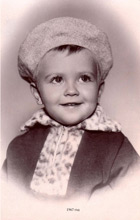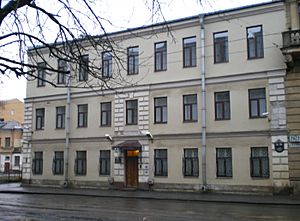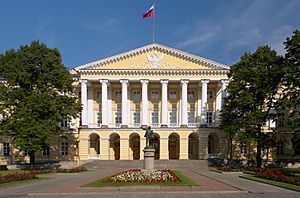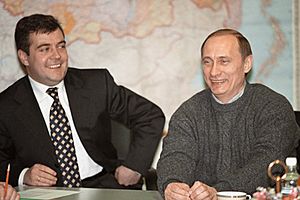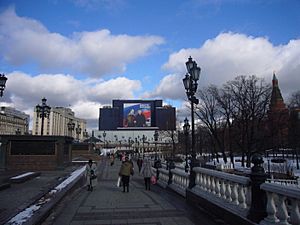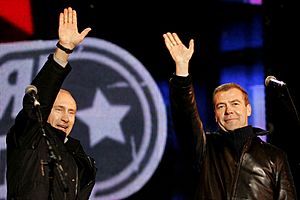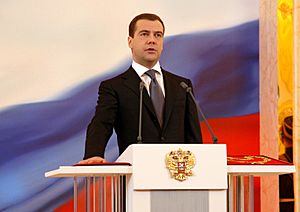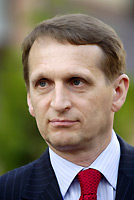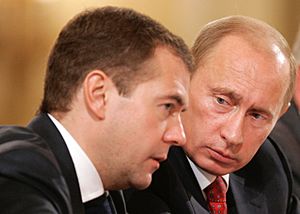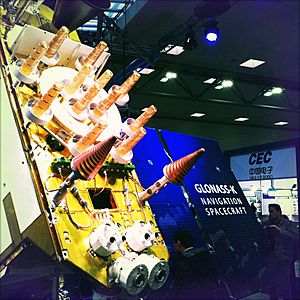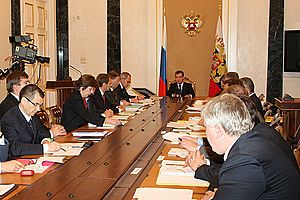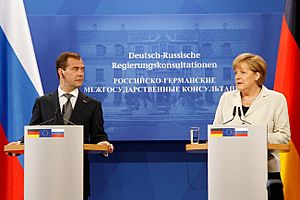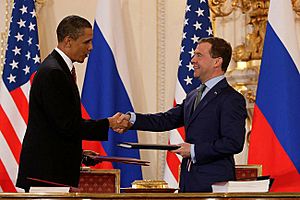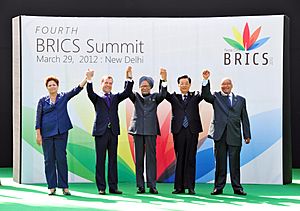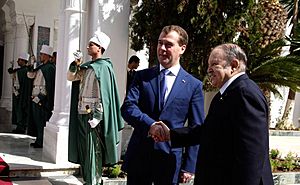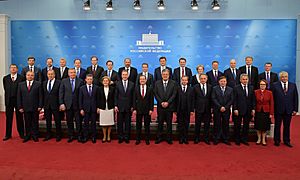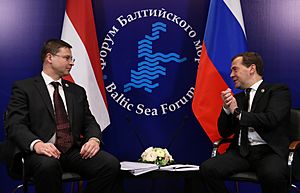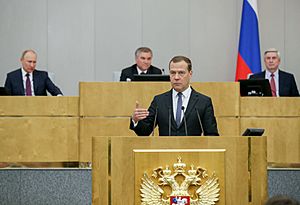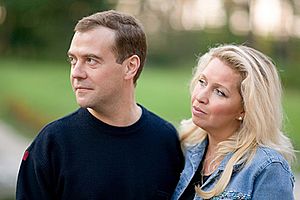Dmitry Medvedev facts for kids
Quick facts for kids
Dmitry Medvedev
|
|
|---|---|
|
Дми́трий Анато́льевич Медве́дев
|
|
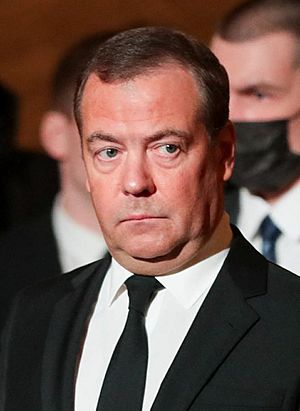
Medvedev in 2022
|
|
| President of Russia | |
| In office 7 May 2008 – 7 May 2012 |
|
| Prime Minister | Vladimir Putin |
| Preceded by | Vladimir Putin |
| Succeeded by | Vladimir Putin |
| Prime Minister of Russia | |
| In office 8 May 2012 – 16 January 2020 |
|
| President | Vladimir Putin |
| Deputy | See list |
| First Deputy | Viktor Zubkov Igor Shuvalov Anton Siluanov |
| Preceded by | Viktor Zubkov (acting) |
| Succeeded by | Mikhail Mishustin |
| Deputy Chairman of the Security Council of the Russian Federation | |
| Assumed office 16 January 2020 |
|
| Chairman | Vladimir Putin |
| Preceded by | Office established |
| First Deputy Prime Minister of Russia | |
| In office 14 November 2005 – 12 May 2008 Serving with Sergei Ivanov
|
|
| Prime Minister | Mikhail Fradkov Viktor Zubkov |
| Preceded by | Mikhail Kasyanov |
| Succeeded by | Viktor Zubkov Igor Shuvalov |
| Kremlin Chief of Staff | |
| In office 30 October 2003 – 14 November 2005 |
|
| President | Vladimir Putin |
| Preceded by | Alexander Voloshin |
| Succeeded by | Sergey Sobyanin |
| Personal details | |
| Born | 14 September 1965 Leningrad, Russian SFSR, Soviet Union |
| Political party | United Russia (2012–present) |
| Other political affiliations |
CPSU (before 1991) Independent (1991–2011) |
| Spouse |
Svetlana Linnik
(m. 1993) |
| Children | 1 |
| Parent | Anatoly Medvedev (father) |
| Education | Leningrad State University |
| Signature | |
| Military service | |
| Allegiance | Russia |
| Branch/service | Russian Armed Forces |
| Years of service | 2008–2012 |
| Rank |
|
| Commands | Supreme Commander-in-Chief |
| Battles/wars |
|
Dmitry Anatolyevich Medvedev (born 14 September 1965) is a Russian politician. He has been the Deputy Chairman of the Security Council of Russia since 2020. Before this, Medvedev was the President of Russia from 2008 to 2012. He also served as the Prime Minister of Russia from 2012 to 2020.
Medvedev became president after winning the 2008 election. Many saw him as more open to new ideas than the previous president, Vladimir Putin. Putin then became prime minister during Medvedev's time as president. Medvedev's main goal as president was a big plan to make Russia's economy and society more modern. He wanted Russia to rely less on oil and gas. During his time, Russia and the United States signed a treaty to reduce nuclear weapons. Russia also won the Russo-Georgian War and recovered from a big economic downturn.
He served one term as president. Putin then became president again after the 2012 election. Medvedev was then chosen by Putin to be prime minister. He and his government stepped down on 15 January 2020. This allowed Putin to make important changes to Russia's constitution. Mikhail Mishustin took over as prime minister. On the same day, Putin gave Medvedev a new job as Deputy Chairman of the Security Council.
Some experts thought Medvedev's presidency might bring positive changes for Russia and its relationships with other countries. However, he later seemed to take on more traditional views.
Contents
- Early Life and Education
- Early Career
- 2008 Presidential Election
- Presidency (2008–12)
- Prime Minister (2012–2020)
- Deputy Chairman of the Security Council (2020–present)
- Personal Life
- Images for kids
- See also
Early Life and Education
Dmitry Medvedev was born on 14 September 1965 in Leningrad, which was part of the Soviet Union. His father, Anatoly Afanasyevich Medvedev, was a chemical engineer and a teacher. His mother, Yulia Veniaminovna Medvedeva, taught Russian. She also worked as a tour guide. The Medvedev family lived in a small apartment in Leningrad. Dmitry was their only child. His family was considered to be part of the "intelligentsia," meaning they were educated and intellectual.
As a child, Dmitry was very curious. His first-grade teacher described him as someone who asked "why" a lot. He loved to learn and would rush home from school to do his homework. In third grade, he read a ten-volume encyclopedia. He was interested in dinosaurs and chemistry. In seventh grade, he met Svetlana Linnik, who would later become his wife. He said his final school exams in 1982 were a "tough period" where he had to work very hard.
Student Years and Academic Career
In 1982, when he was 17, Medvedev started studying law at Leningrad State University. He also thought about studying languages, but he never regretted choosing law. He found the subject very interesting. Other students said he was fair and good at discussing ideas without upsetting people.
During his university years, Medvedev enjoyed English rock bands like Black Sabbath and Led Zeppelin. He also liked sports, especially rowing and weightlifting.
He finished law school in 1987. After graduating, he decided to continue his studies in civil law. In 1990, he earned his law degree by defending his research paper.
One of Medvedev's university professors was Anatoly Sobchak, an important democratic politician. In 1988, Medvedev joined Sobchak's team and helped him win a seat in the Soviet parliament.
After this, Medvedev continued teaching civil and Roman law at his university, which was renamed Saint Petersburg State University. He taught there until 1999. Students liked him, saying he was "strict but not harsh." He also helped write a popular civil law textbook. To earn more money, he worked at a small law firm he started with friends.
Early Career
Career in St. Petersburg
In 1990, Anatoly Sobchak became the head of the Leningrad City Council. Sobchak hired Medvedev, who had managed his election campaign. Vladimir Putin, another former student of Sobchak, also became an adviser. When Sobchak was elected Mayor, Medvedev became a consultant for the City Hall's Committee for Foreign Affairs, which Putin led.
In 1993, Medvedev became the legal director for Ilim Pulp Enterprise (ILP), a timber company in St. Petersburg. He helped the company grow a lot. Medvedev owned 20% of the company's shares. ILP became Russia's largest timber company. Medvedev sold his shares in 1999 before moving to a job in the central government.
Career in the Central Government
In 1996, Vladimir Putin moved to work in the Russian presidential administration. Three years later, in August 1999, Putin became Prime Minister. In November 1999, Medvedev was one of several people from St. Petersburg who Putin brought to high government positions in Moscow. On 31 December, he became a deputy head of the presidential staff, working closely with Putin. In January 2000, Medvedev was promoted to a very high federal state civilian service rank. He also managed Putin's campaign for the 2000 presidential elections, which Putin won. Medvedev said he really enjoyed this work.
As president, Putin started a campaign against corruption. He appointed Medvedev as chairman of the gas company Gazprom's board of directors in 2000. Medvedev helped fix problems with tax evasion and misuse of company money. He served as deputy chair from 2001 to 2002, then became chairman again in June 2002 until he became president in 2008. During his time, Gazprom's debts were reorganized, and its value grew a lot. Medvedev also led Russia's talks with Ukraine and Belarus during gas price disagreements.
In October 2003, Medvedev became the presidential chief of staff. In November 2005, Putin appointed him as first deputy prime minister of Russia. In this role, Medvedev was in charge of important national projects. These projects focused on improving public health, education, housing, and agriculture. The program increased wages in healthcare and education and built new apartments.
Presidential Candidate
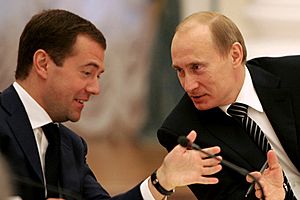
After becoming first deputy prime minister, many people thought Medvedev might run for president in 2008. Some Western observers thought he was too liberal for Putin to support. However, opinion polls showed Medvedev was often the most popular choice among Russians for Putin's successor.
On 10 December 2007, President Putin announced that Medvedev was his preferred candidate. Four pro-Kremlin parties supported Medvedev's candidacy, and Putin endorsed him. United Russia, the main party, officially supported him on 17 December 2007. Medvedev registered his candidacy and said he would step down as chairman of Gazprom, as the president cannot hold another job. Putin said he trusted Medvedev and believed he would be a good president.
2008 Presidential Election
Election Campaign
As the 2 March 2008 election got closer, Vladimir Putin was still the most popular politician in Russia. A poll in December 2007 showed that 79% of Russians would vote for Medvedev if the election were held then. Much of Putin's popularity helped Medvedev, with many people saying Medvedev's strength came from Putin's support.
In his first speech after being endorsed, Medvedev said that if he became president, he would appoint Vladimir Putin as prime minister. This would allow Putin to remain an important figure in Russian politics. Putin said he would accept the role. Election posters showed them together with the slogan "Together We Win." Medvedev promised to work closely with Putin.
Medvedev's campaign was quiet. He did not take part in televised debates, saying he was too busy as first deputy prime minister. Instead, he shared his ideas on his election website.
In January 2008, Medvedev started his campaign by visiting different regions. On 22 January 2008, he gave his first major campaign speech. He talked about a "liberal-conservative" plan to modernize Russia. He said Russia needed "decades of stable development" and had "exhausted its share of revolutions." He focused on modernizing Russia while keeping the country stable. On 15 February 2008, Medvedev gave another important speech, saying:
Freedom is better than non-freedom – this principle should be at the core of our politics. I mean freedom in all its manifestations – personal freedom, economic freedom and, finally, freedom of expression.
In this speech, Medvedev strongly criticized Russia's "legal nihilism," which means a lack of respect for the law. He said the country needed an independent justice system and a plan to fight corruption. For the economy, he supported private property, less government control, and lower taxes. He said Russia's economy should focus on four "I"s: institutions, infrastructure, innovation, and investment.
Election Win
Medvedev was elected President of Russia on 2 March 2008. He received 70.28% of the votes. The turnout was 69.78% of registered voters. Most of his votes came from people who supported Putin.
Presidency (2008–12)
Inauguration
On 7 May 2008, Dmitry Medvedev became the third president of the Russian Federation. The ceremony was held in the Grand Kremlin Palace. After taking his oath, he said:
I believe my most important aims will be to protect civil and economic freedoms... We must fight for a true respect of the law and overcome legal nihilism, which seriously hampers modern development.
His inauguration was close to the Victory Day celebration on 9 May. He attended the military parade and signed a decree to provide housing for war veterans.
Personnel Appointments
On 8 May 2008, Medvedev appointed Putin as Prime Minister of Russia, as he had promised. The State Duma, Russia's parliament, approved this choice.
On 12 May 2008, Putin suggested names for his new government, and Medvedev approved them. Most officials stayed in their jobs, but there were some important changes. For example, Sergei Naryshkin became the new head of the presidential administration. Medvedev also brought in some of his old classmates and trusted people into his team.
Medvedev tried to keep a balance among different groups in the government. However, the influence of powerful security officials seemed to lessen for the first time in 20 years. Instead, Medvedev brought in more civil law scholars, who he preferred for high positions.
"Tandem Rule"
From the start of Medvedev's presidency, people wondered about his relationship with Putin. The Russian constitution gives a lot of power to the president. But now, the prime minister (Putin) was also very influential and popular. Journalists called this new system "government by tandem" or "tandemocracy," referring to Medvedev and Putin as the "ruling tandem."
Some experts believed Putin was ready to step back at first. But two major events – the global financial crisis and the 2008 South Ossetia war – made Putin take a stronger role again.
Main External Events
2008 Russo-Georgian War
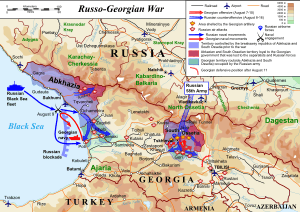
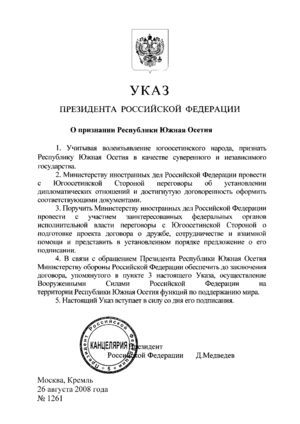
A long-standing conflict between Georgia and the regions of South Ossetia and Abkhazia grew worse in the summer of 2008. These regions were supported by Russia. On 1 August 2008, South Ossetian forces began attacking Georgian villages. Georgia sent its army into the South Ossetian conflict zone on 7 August to stop these attacks.
When the attack happened, Medvedev was on vacation, and Putin was at the Olympic opening ceremony in Beijing. Medvedev likely approved the use of force against Georgia on 8 August. The next day, Medvedev said:
Last night, Georgian troops committed what amounts to an act of aggression against Russian peacekeepers and the civilian population in South Ossetia ... In accordance with the Constitution and the federal laws, as President of the Russian Federation it is my duty to protect the lives and dignity of Russian citizens wherever they may be. It is these circumstances that dictate the steps we will take now. We will not allow the deaths of our fellow citizens to go unpunished. The perpetrators will receive the punishment they deserve.
Russian military forces launched a counter-attack on 8 August. After five days of fighting, Georgian forces were pushed out of South Ossetia and Abkhazia. On 12 August, Medvedev ended the Russian military operation. Later that day, a peace deal was signed. On 26 August, Medvedev signed a decree recognizing South Ossetia and Abkhazia as independent states. The conflict resulted in casualties for both sides.
Most Russians supported the military action. Medvedev's popularity increased by about 10 percentage points, reaching over 70%, because people thought he handled the war well.
After the conflict, Medvedev created a 5-point plan for Russian foreign policy, known as the Medvedev Doctrine. In 2009, an international report stated that while there were provocations from both sides, the conflict began with a large Georgian military operation.
2008–09 Economic Crisis
In September 2008, Russia was affected by the global financial crisis. Before this, Russian officials thought the country would be safe because of its strong economy and large reserves. However, the recession was the worst in Russia's history, and the country's economy shrank by over 8% in 2009. The government used a lot of money to help banks and struggling companies. No major banks failed. The economy became stable in 2009, but strong growth didn't return until 2010. Medvedev's approval ratings went down during the crisis but recovered later.
Some experts believe the economic crisis and the 2008 war delayed Medvedev's plans for reforms. Instead, the government had to focus on dealing with the crisis and the war's effects.
Domestic Policy
Economy
Medvedev started a modernization program to improve Russia's economy and society. He wanted to reduce Russia's reliance on oil and gas and create a diverse economy based on high technology and new ideas. The program focused on five main areas: efficient energy use, nuclear technology, information technology, medical technology and medicines, and space technology combined with telecommunications.
In November 2010, Medvedev said that the government should sell off unneeded state-owned companies. He believed the money from these sales should be used to modernize the economy.
Medvedev also said that technological innovation was a key priority. In May 2009, he created the Presidential Commission on Innovation, which he led himself. He also stated that large state companies would eventually be privatized.
In June 2010, he visited the Twitter headquarters in Silicon Valley. He said he wanted to bring more high-tech innovation and investment to Russia.
Police Reform
Medvedev made reforming Russia's police force a top priority. He started the reform in late 2009. In August 2010, a draft law was put online for public discussion, and many people commented on it. Based on this feedback, changes were made to the draft. On 7 February 2011, President Medvedev signed the bill into law, and the changes took effect on 1 March 2011.
The reform increased police officers' salaries by 30%. It also reduced the number of Interior Ministry personnel and centralized control over the police. A lot of money was set aside for the police reform.
Anti-Corruption Campaign
On 19 May 2008, Medvedev signed a decree on anti-corruption measures, creating an Anti-Corruption Council. At the first meeting on 30 September 2008, Medvedev said:
I will repeat one simple, but very painful thing. Corruption in our country has become rampant. It has become commonplace and characterises the life of the Russian society.
In July 2008, Medvedev's National Anti-Corruption Plan was published. It suggested stronger punishments for corruption. It also made it mandatory for officials to report corruption. A law called On Corruption Counteraction was signed on 25 December 2008. This law was seen as an important step, even if early results were small. Russia's score in the Corruption Perceptions Index slightly improved in 2009, which was seen as a positive sign.
On 13 April 2010, Medvedev signed a decree introducing the National Anti-Corruption Strategy. This strategy included higher fines for corruption and more public oversight of government spending.
In January 2011, President Medvedev admitted that the government had not yet fully succeeded in its anti-corruption efforts.
On 4 May 2011, Medvedev signed a law that increased fines for corruption. Fines could be up to 100 times the amount of the bribe, with a maximum fine of 500 million rubles.
Education
President Medvedev started a new policy called "Our New School." He asked the government to report on its progress every year.
Development of the Political System
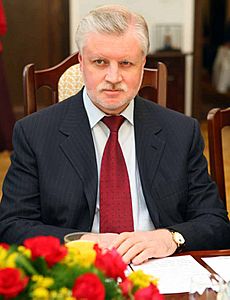
Regional elections on 1 March 2009 led to accusations that government resources were used to help United Russia candidates. Medvedev met with the head of the election commission and called for fair use of resources. In August 2009, Medvedev promised to reduce the strong position of the United Russia party. He said "New democratic times are beginning." However, the next regional elections in October 2009 were again criticized for unfair practices. Opposition parties even walked out of parliament in protest. Some experts wondered if Medvedev truly wanted to change Russia's political system.
In November 2010, Medvedev said that the dominance of the United Russia party was harming Russia's politics. He warned that the country could face political stagnation if the ruling party was not challenged. He also said Russian democracy was "imperfect" but getting better.
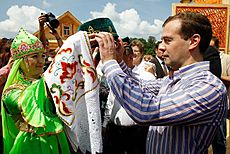
In his first State of the Nation address on 5 November 2008, Medvedev suggested changing the Constitution of Russia. He proposed increasing the terms for the president from four to six years, and for the State Duma from four to five years.
Medvedev also signed a law in June 2009 that changed how the chairperson and deputies of the Constitutional Court are chosen. They would now be suggested by the president, instead of being elected by the judges themselves.
On 30 October 2009, for the Day of Remembrance of the Victims of Political Repressions, President Medvedev spoke about the importance of remembering national tragedies. He said that the memory of victims of political repression is as important as the memory of victory. He stressed that nothing is more important than human life.
In a speech on 15 September 2009, Medvedev said he approved of the decision in 2004 to stop direct elections for regional leaders. This meant the Kremlin would appoint them. He added that he didn't see a return to direct elections happening even in 100 years.
Election Law Changes
In 2009, Medvedev proposed changing the election law to lower the minimum percentage of votes a party needs to get seats in the State Duma from 7% to 5%. This change was signed into law. Parties getting between 5% and 6% of votes would get one seat, and those between 6% and 7% would get two seats.
Russian election law says that parties already in the State Duma can easily put forward candidates. Parties not in the Duma need to collect signatures. Under Medvedev's changes, the number of signatures needed was lowered from 200,000 to 150,000 for the 2011 Duma elections. For future elections, only 120,000 signatures will be needed.
Foreign Policy
In August, during Medvedev's third month as president, Russia was involved in the 2008 South Ossetia war with Georgia. This caused high tension in Russia–United States relations. On 26 August, Medvedev officially recognized Abkhazia and South Ossetia as independent states. This action was criticized by the G8. On 31 August 2008, Medvedev outlined Russia's foreign policy principles:
- International law is most important.
- The world will have many powerful countries.
- Russia will not seek conflict with other nations.
- Russia will protect its citizens everywhere.
- Russia will build ties with friendly regions.
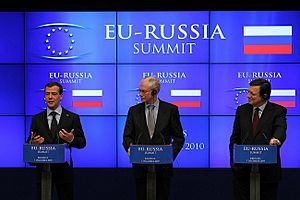
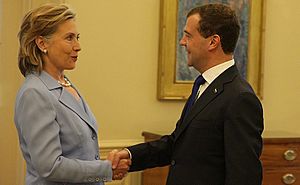
In his address to the parliament on 5 November 2008, he also said Russia would deploy missiles in Kaliningrad Oblast. This was to counter the U.S. missile defense system in Eastern Europe. However, after U.S. President Barack Obama decided not to deploy missile defense elements in the Czech Republic and Poland, Medvedev said Russia would not deploy the missiles in Kaliningrad.
In 2011, Medvedev said that the war with Georgia had prevented further expansion of NATO.
In 2011, Medvedev stated that the idea of Karl Marx about class struggle is dangerous. He said that when there are big differences between rich and poor, especially during economic difficulties, this idea can lead to conflicts and even terrorism.
In August 2014, President Barack Obama said that he had a "very productive relationship" with President Medvedev.
During a visit to Armenia on 7 April 2016, Prime Minister Dmitry Medvedev visited the Tsitsernakaberd Memorial Complex. He paid tribute to the victims of the Armenian genocide. Russia had recognized this event in 1995.
Relationship with Putin
Even though the Russian constitution gives more power to the president, people wondered who held more power: Medvedev or Prime Minister Vladimir Putin. Some observers noted that Medvedev used a more formal way of saying "you" when talking to Putin, while Putin used a less formal way when talking to Medvedev.
A poll in September 2009 showed that 13% of Russians thought Medvedev had the most power, 32% thought Putin did, and 48% thought they shared equal power. Medvedev tried to show his authority by saying, "I am the leader of this state, I am the head of this state, and the division of power is based on this."
2012 Presidential Elections
Both Putin and Medvedev could have run for president in the 2012 elections. Some experts thought Medvedev was trying to create a different image from Putin. For example, his dealings with NATO and the United States might have been to show he could work well with Western countries. He also spoke about the need for a stronger opposition in Russian politics. However, other experts believed this was an exaggeration and that Medvedev and Putin were working together to gain support from different groups in society.
On 24 September 2011, at a United Russia party meeting, Medvedev suggested Vladimir Putin as the party's presidential candidate. He revealed that they had agreed long ago for Putin to return to the presidency in 2012. This move was called "rokirovka," which is the Russian word for the chess move "castling." Medvedev said he would be ready to work in the government. Putin accepted and supported Medvedev for the prime minister position if United Russia won the upcoming legislative election.
On 22 December 2011, in his last state of the nation address, Medvedev called for big changes to Russia's political system. This included bringing back elections for regional governors and allowing half the seats in the State Duma to be directly elected. He said, "I want to say that I hear those who talk about the need for change, and understand them." However, opposition parties felt these proposals were not enough to address concerns about the 4 December election.
On 7 May, his last day as president, Medvedev signed his final documents. These included measures for civil society, human rights protection, and modernization. He also approved a program to improve engineers' skills for Russia's economic development.
Prime Minister (2012–2020)
First Term
On 7 May 2012, the same day he left the presidency, Dmitry Medvedev was nominated by President Vladimir Putin to be prime minister. On 8 May 2012, the State Duma confirmed Medvedev for the post. Putin's United Russia party, now led by Medvedev, had won most seats in the 2011 election. Medvedev's nomination was approved with 299 votes in favor.
First Year
Medvedev became prime minister on 8 May 2012.
On 19 May 2012, Dmitry Medvedev attended the G-8 Summit in the United States, representing Russia instead of President Putin. He was the first prime minister to represent Russia at a G-8 meeting. On 21 May 2012, his government was appointed and approved by the president. On 26 May, he was officially appointed as the chairman of United Russia, the ruling party. He had joined the party earlier that week, becoming Russia's first prime minister to be part of a political party.
Crimea
After the 2014 Ukrainian revolution, Russia annexed the Crimean Peninsula. On 31 March 2014, Medvedev visited Crimea after it became part of Russia. During his visit, he announced the creation of the Federal Ministry for Crimea Affairs.
Second Term
On 7 May 2018, Vladimir Putin nominated Dmitry Medvedev for another term as prime minister. On 8 May, the State Duma confirmed him with 374 votes. On 15 May, Putin approved the structure of the government, and on 18 May, its members.
In the summer of 2018, there were protests across the country against a plan by Medvedev's government to raise the retirement age. This plan was announced on the opening day of the 2018 FIFA World Cup in Russia. As a result, the popularity of both Medvedev and President Putin decreased. After the 2019 Siberia wildfires, Medvedev suggested reviewing rules for fighting fires and getting advice from foreign experts.
Resignation
Medvedev and his entire government resigned on 15 January 2020. This happened after Putin gave a speech suggesting changes to the constitution. Medvedev said he was resigning to allow Putin to make these important changes, which would "significantly change Russia's balance of power." Putin accepted the resignation.
Putin then suggested that Medvedev take the new post of deputy chairman of the Security Council.
Deputy Chairman of the Security Council (2020–present)
On 16 January 2020, Medvedev was appointed as deputy chairman of the Security Council of Russia. In a July interview, Medvedev said he still had "good friendly relations" with President Putin.
Personal Life
Medvedev is married to Svetlana Vladimirovna Medvedeva. They have a son named Ilya Dmitrevich Medvedev, born in 1995. Svetlana was his childhood friend and school sweetheart. They married after finishing secondary school.
Medvedev is a fan of British hard rock music. His favorite bands include Led Zeppelin, Black Sabbath, Pink Floyd, and Deep Purple. He collects their original vinyl records. He has said he has all of Deep Purple's recordings. In February 2008, Medvedev and Sergei Ivanov went to a Deep Purple concert in Moscow together.
During a visit to Serbia, Medvedev received a high award from the Serbian Orthodox Church. This was for his efforts to unite Orthodox churches and his love for the Serbian people.
Medvedev exercises every day, swimming and weight training. He also jogs, plays chess, and practices yoga. His hobbies include reading books by Mikhail Bulgakov and the Harry Potter series. He is also a fan of football and supports his hometown team, FC Zenit Saint Petersburg.
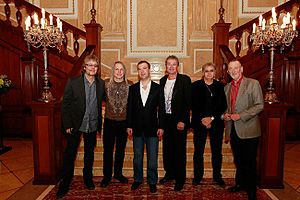
Medvedev is an enthusiastic amateur photographer. In January 2010, one of his photos was sold at a charity auction for a large sum of money. The photo was bought by Mikhail Zingarevich, who was a co-founder of the Ilim Group, where Medvedev worked as a lawyer in the 1990s.
Medvedev speaks English in addition to his native Russian, but he usually speaks only Russian during interviews.
Images for kids
See also
 In Spanish: Dmitri Medvédev para niños
In Spanish: Dmitri Medvédev para niños


